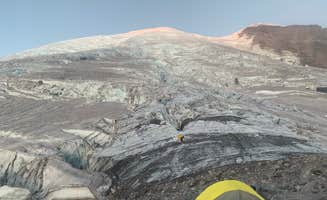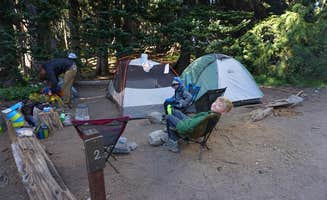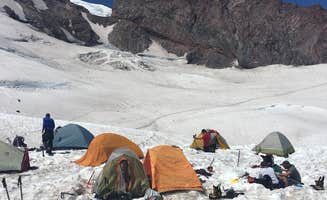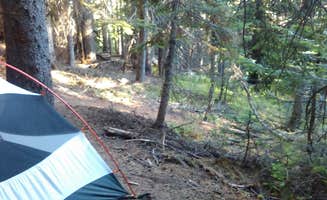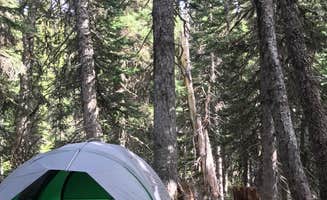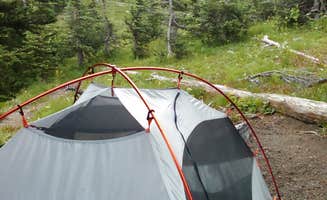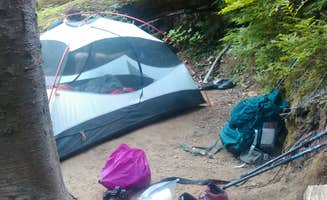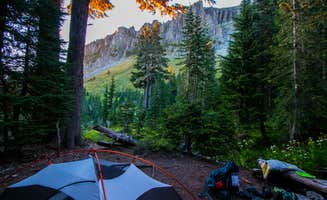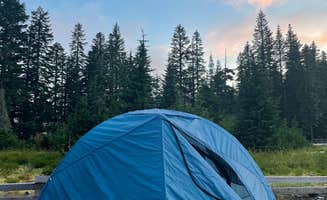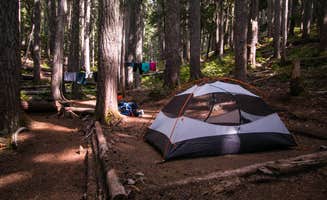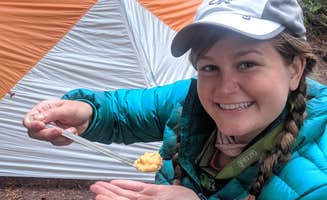Mount Rainier National Park campgrounds typically operate at elevations between 2,000 and 6,000 feet, creating significant temperature variations throughout the year. Many campsites within the national park remain snow-covered until late June, with winter closures generally beginning in October. Average summer temperatures range from 60-80°F during the day but can drop below 40°F at night in higher elevation campgrounds.
What to do
Hike to Goat Falls from Silver Springs: Access the Goat Falls trailhead near Silver Springs Campground, which is often overlooked by visitors focused on the national park trails. "There is good hiking along the river from the campground," notes one visitor, while another mentions that the campground provides "close access to several hiking trailheads, the White River itself, Goat Falls trailhead (almost no parking there)."
Explore Crystal Mountain: During summer months, take the gondola ride from Crystal Mountain Resort for panoramic views. "Crystal Mountain Ski Resort (open in the summer for Gondola rides to the top of the ridge with amazing 360 degree views and a restaurant (check for last seating times))" is easily accessible from nearby campgrounds according to a Silver Springs camper.
Visit the Blue Hole swimming area: A short drive from La Wis Wis Campground leads to this popular swimming spot. "Blue hole is breathtaking and just 30 min. from Mt. Rainier National Park," writes a camper. Another visitor adds, "Be sure to check out Blue Hole, a beautiful swimming hole with a very rocky beach."
Watch for aviation activity: Ranger Creek Airstrip Dispersed Camping offers a unique opportunity to observe small aircraft. "This is such a cool place to camp! You are literally right on an active airstrip," reports a camper. "While no planes came in while I was there, I walked across the airstrip to the 'comfort station' for fliers and read the log book. Two planes had flown in earlier in the day and left nice messages."
What campers like
River sites for natural soundscapes: Riverside camping spots are highly valued throughout the region. At White River Dispersed Camping, "the sound of the creek" drowns out road noise according to one camper, who adds, "Spots by the river looked kind of close together, so we drove a little further in and found a large secluded spot in the woods." Similarly, at The Dalles Campground, "The river sites sit on a bluff overlooking the White River."
Old-growth forest settings: Many campgrounds feature impressive stands of mature trees. "The campground itself was a lovely family friendly campground with easy access to toilets and water with decent privacy," notes a visitor to The Dalles Campground. At La Wis Wis Campground, campers appreciate the "Enchanted Forest Grove" atmosphere where "sites are green and shaded."
Proximity to Mount Rainier entrances: Convenient park access is a major draw. "This campground is in a great spot just outside of Mt Rainier NP and at the bottom of Crystal Mountain (20 min drive to the resort village/gondola etc)," writes a camper at The Dalles Campground. Similarly, Silver Springs visitors value being "close to the Sunrise Mt. Rainier entrance."
Winter camping options: Some areas remain accessible during colder months. Ranger Creek campers note, "Best in late fall when it's cooler. Less loud drunkards," though they caution about "a incredibly steep hill near the end of the loop that is absolutely not safe in winter."
What you should know
Road conditions vary significantly: Many dispersed sites require navigating unpaved roads. At White River Dispersed, "The road can be a bit thin, so I would be careful with extra large vehicles. It is also a bit of a challenging road, so low clearance vehicles wouldn't be treated well." Similarly, at Ranger Creek, "Road gets a bit worse as you drive further, but it was manageable."
Highway noise affects certain sites: At The Dalles Campground, "the sites closest to highway 410 (sites 1-24) are noisy from traffic." One camper warns, "The sites that were adjacent to the hwy were so exposed and close, it was almost like camping on the shoulder."
Cell service is limited: Most areas have minimal connectivity. At Ranger Creek Airstrip, "Cell signal was very weak for Verizon and non-existent for ATT," while at White River Dispersed, campers report "No T-Mobile service." This affects planning and navigation, so download offline maps before arrival.
Campsite availability patterns: For last-minute camping, timing matters. "Like most campgrounds in Washington, by Sunday afternoon the campground is empty. For your best camping experience here, camp Sunday through Wednesday," advises a Silver Springs visitor. Conversely, at White River Dispersed, a camper noted, "We arrived mid-afternoon on a Friday and there were plenty of options to pick from but it did fill up by around 9pm."
Tips for camping with families
Seek river sites for natural noise barriers: At Mowich Lake Campground within Mount Rainier National Park, "all spots are right next to each other so not a lot of privacy," but riverside locations provide natural sound buffers. Similarly, at The Dalles, some campsites may be noisy, but "the river current is too strong and fast for playing in."
Consider safety around steep riverbanks: Exercise caution with young children at certain campgrounds. At The Dalles Campground, "If I had small children (walking but under 4) I wouldn't stay in the sites directly along the river. The embankment is easily accessible, very steep and unstable in spots."
Look for ranger programs: Educational activities enhance family camping. At Ohanapecosh Campground, there are "amazing ranger led activities for the kids" and a "Visitor center in the campground, fun ranger programs."
Bring essentials for primitive sites: Dispersed camping requires more preparation. At Ranger Creek, "There are no services here—no water, no wifi, no trash pick up, no campground host (there is a moderately clean vault toilet)." A camper advises, "I strongly suggest you have a way to secure your food and trash as there are lots of squirrels and raccoons."
Tips from RVers
Check campground accessibility: Some campgrounds have limitations for larger vehicles. At Cougar Rock Campground, "the driveways are kind of small" according to one visitor, while another notes the campground is "pretty large and each site is set back a little to give you some additional privacy." Consider size limitations when planning your stay.
Navigate narrow access roads carefully: Older campgrounds often have tighter road systems. At La Wis Wis, "the road in the campground is very narrow" and the campground features "smaller roads and bigger campsites. This makes it great for tent campers and those with smaller RV's or tent trailers. The larger loud RV's would not fit in the spots or on the roads."
Be prepared for limited amenities: Most campgrounds near Mount Rainier lack full hookups. A camper at Silver Springs noted, "There are several water spigots scattered throughout the dry camping loop, although they weren't threaded so we couldn't run a hose to them." Plan water usage accordingly.
Check for designated big rig spaces: While some campgrounds can accommodate larger RVs, specific areas may be better suited. At Ranger Creek Airstrip, a camper advises, "For larger rigs - take the second left at a Y-intersection, and then keep to the left and you won't have any trouble getting in. Going to the right at the Y takes you to an area that big rigs might have trouble finding spots or turning around."


